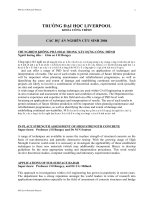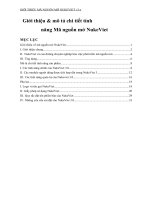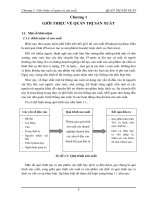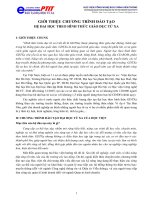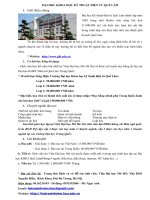Gioi thieu Renishaw
Bạn đang xem bản rút gọn của tài liệu. Xem và tải ngay bản đầy đủ của tài liệu tại đây (277.23 KB, 8 trang )
Optical off
Optical switch off when commanded by M code.
Optical on
Optical switch on when
commanded by M code.
Shank switch on
Spin off
Spin at 650 rev/min for 1 sec minimum (6 sec maximum).
Spin on
Spin at 650 rev/min for 1 sec
minimum (6 sec maximum).
Shank switch off
Timer off (time out)
Time out will occur (12, 33 or 134 sec) after the last probe
trigger or reseat.
A timer automatically switches the probe off after 90 min
from last trigger if not spun.
Timer off (time out)
Time out will occur (12, 33 or 134 sec) after the last probe
trigger or reseat.
Optical on
Optical switch on when
commanded by auto start
Timer off (time out)
Time out will occur (12, 33 or 134 sec) after the last probe
trigger or reseat.
A timer automatically switches the probe off after 90 min
from last trigger if not turned off by M code.
Switch-off methods available
Switch-on method
Probe settings
17
Probe settings
In Legacy mode a start filter improves the
probe’s resistance to these effects.
The OMP60 can be operated in either ‘Legacy’
or ‘Modulated’ optical transmission modes.
Probes subjected to particular forms of light
interference may accept spurious start signals.
Optical transmission method
Factory set to OFF.
It may be necessary to reduce the probe approach
speed to allow for the increased stylus overtravel
during the extended time delay.
When the filter is enabled, a constant nominal
10, 20 or 40 ms delay is introduced to the probe
output.
Probes subjected to high levels of vibration or
shock loads may output signals without having
contacted any surface. The enhanced trigger filter
improves the probes resistance to these effects.
Enhanced trigger filter
18
Factory set to standard optical power.
Dotted lines on performance envelopes
represent the OMP60 in low optical power.
Where the separation between OMP60 and the
OMI-2, OMI or OMM is small, the low optical
power may be used. In this setting, the optical
transmission range will be reduced as shown
on performance envelopes, so battery life will
be extended.
Low optical power
In Modulated mode, the OMP60 becomes
compatible for use with OMI-2, to provide
substantially increased resistance to light
interference.
It may be necessary to revise the probe program
software to allow for the increased activation time.
When Legacy (start filter on) is enabled, an
additional 2 sec delay is introduced to the probe
activation (switch on) time.
OPTICAL OFF
or SPIN OFF
or
or
SHANK ON
or
134 sec
33 sec
12 sec
or
LONG TIME OUT
MEDIUM TIME OUT
SHORT TIME OUT
or
SPIN ON
SWITCH OFF METHOD (omitted for SHANK ON)
OPTICAL ON
LED CHECK
SWITCH ON METHOD
3. LEDs will show the following sequence.
2. DO NOT deflect stylus when reviewing settings.
1. Insert batteries, or if already inserted remove
for 5 sec and replace.
Reviewing current probe settings
Reviewing current probe settings
19
20
or
20 ms
ON
or
BATTERY STATUS
or
OPTICAL POWER
BATTERY LOW
STANDARD
or
or
MODULATED
PROBE IN STAND-BY MODE (after 5 sec)
BATTERY GOOD
LOW
or
LEGACY
(start filter on)
LEGACY
(start filter off)
OPTICAL TRANSMISSION METHOD
10 ms
0 sec
or
ON
OFF
ENHANCED TRIGGER FILTER SETTING
Reviewing current probe settings
40 ms
ON
Note:
Settings are saved as they are changed
3. The probe is now in configuration mode and
will flash the current switch on method.
Trigger logic is now active enabling probe
settings to be changed as shown on next page.
See ‘Probe settings’ for further details
Note:
If battery power is low then each of the 5 red
flashes will be followed by a blue flash
2. Following the LED check, deflect the stylus and
hold deflected until 5 red flashes occur at end of
the review sequence.
1. Insert batteries or if already inserted, remove for
5 seconds and replace.
Probe settings can be configured using trigger logic.
Changing probe settings
<
> 20 sec
>
21
Leave stylus
untouched
(for period shown)
Deflect stylus for
more than 4 seconds
Deflect stylus for
less than 4 seconds
KEY
Changing probe settings
22
OPTICAL
or
SPIN
<
>
OPTICAL ON
>
SHANK ON
<
>
NEW
SETTINGS
COMPLETE
SPIN ON
12 sec
SHORT
TIME OUT
<
>
33 sec
MEDIUM
TIME OUT
<
>
TO CHANGE SWITCH OFF METHOD (omitted for SHANK ON)
<
TO CHANGE SWITCH ON METHOD
Changing probe settings
>
134 sec
<
> 20 sec
LONG
TIME OUT
<
>
OFF
LEGACY
<
>
(start filter off)
0 sec
<
>
ON
<
>
NEW
SETTINGS
COMPLETE
20 ms
<
>
(start filter on)
LEGACY
<
>
MODULATED
TO CHANGE OPTICAL TRANSMISSION METHOD
10 ms
ON
TO CHANGE ENHANCED TRIGGER FILTER SETTING
<
>
> 20 sec
40 ms
ON
Changing probe settings
<
>
23
24
LOW
Return to
>
STANDARD
NEW
SETTINGS
COMPLETE
‘TO CHANGE
SWITCH ON METHOD’
<
TO CHANGE OPTICAL POWER
Changing probe settings
>
> 20 sec
<
These will be needed if the
probe is replaced.
For quick reference Renishaw
suggest you record your
settings on the table at back of
this User’s guide.
Settings record table
It is recommended that settings
are reviewed after programming.
Review current
probe settings
In stand-by mode the OMP60
is waiting for a switch on signal.
LEDs are not lit unless the
battery is ‘dead’. (see Operating
mode - probe status LEDs, for
further information)
Stand-by mode

